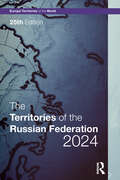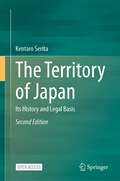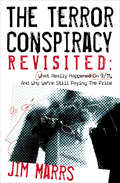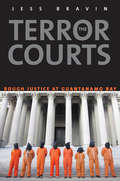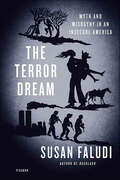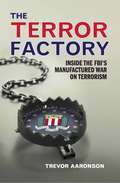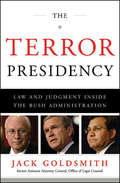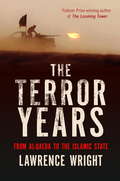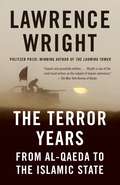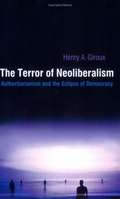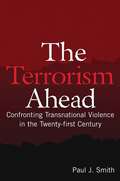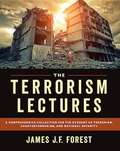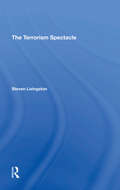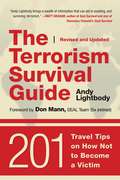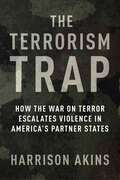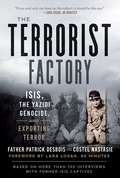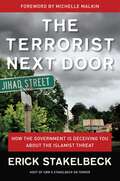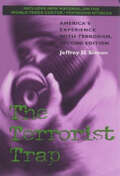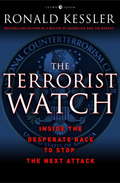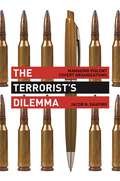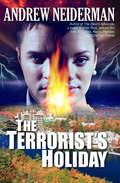- Table View
- List View
The Territories of the Russian Federation 2024 (Europa Territories of the World series)
This excellent reference source brings together hard-to-find information on the constituent units of the Russian Federation.The introduction examines the Russian Federation as a whole, followed by a chronology, demographic and economic statistics, and a review of the Federal Government. The second section comprises territorial surveys, each of which includes a current map. This edition includes surveys covering the annexed (and disputed) territories of Crimea and Sevastopol, as well as updated surveys of each of the other 83 federal subjects. The third section comprises a select bibliography of books. The fourth section features a series of indexes, listing the territories alphabetically, by Federal Okrug and Economic Area. Users will also find a gazetteer of selected alternative and historic names, a list of the territories abolished, created or reconstituted in the post-Soviet period, and an index of more than 100 principal cities, detailing the territory in which each is located.
The Territory of Japan: Its History and Legal Basis
by Kentaro SeritaThis Open Access book carefully examines the legal and historical bases of the territory of Japan as a modern State from the Meiji period to 2002. A new preface summarizes key developments in the situation up through 2022.Japan’s current territory is stipulated by the Potsdam Declaration (1945) and the Treaty of Peace with Japan (1951); it includes the Northern Territories, the Senkaku Islands, and Takeshima. Japan has demanded the return of the Northern Territories, comprising the islands of Etorofu, Kunashiri, Shikotan and Habomai, which are occupied by Russia. China has claimed sovereignty over the Senkaku Islands, which are validly controlled by Japan; Japan has claimed sovereignty over Takeshima, which is occupied by the Republic of Korea.This book analyzes the current status of these territorial topics, drawing on historical documents and international legal precedent, and it suggests peaceful methods to address them. In discussing territorial land, sea, and air space, this work touches upon postwar concepts defining modern international law and relevant rules on these subjects—exclusive economic zones (EEZs), continental shelves, and air defense identification zones (ADIZs)—found in international treaties, such as the United Nations Convention on the Law of the Sea (UNCLOS), and related domestic laws.
The Terror Conspiracy Revisited: What Really Happened On 9/11, And Why We're Still Paying The Price
by Jim MarrsThe New York Times bestselling journalist and leading conspiracy writer presents his latest findings on the truth behind the 9/11 terror attacks. The terror attacks of September 11, 2001 ushered the United States into an era of war across the Middle East and government surveillance at home. In The Terror Conspiracy Revisited, Jim Marrs updates his authoritative dissection of the official story of 9/11. This revised edition is packed with explosive material including: The revelations of former New Jersey attorney General John Farmer, who served as Senior Counsel to the 9/11 Commission: "At some level of the government, at some point in time. . .there was an agreement not to tell the truth about what happened."Commission cochairman Thomas Kean's suspicion of deceit: "We to this day don't know why NORAD told us what they told us. It was just so far from the truth."The conclusion of European scientists that there was nanothermite in the World Trade Center debris, a high explosive generally available only through the US military.The investigation by Pilots For 9/11 Truth and their conclusion that hijackers could not have accessed the cockpit of Flight 77. One thing we know to be true is that the full truth about the September 11th attacks has not yet been presented to the American public. Jim Marrs thoroughly dismantles the credibility of the US government's narrative and leaves the reader with some unsavory but indisputable conclusionsesented to the American public. Jim Marrs thoroughly dismantles the credibility of the US government's narrative and leaves the reader with some unsavory but indisputable conclusions.
The Terror Courts
by Jess BravinSoon after the September 11 attacks in 2001, the United States captured hundreds of suspected al-Qaeda terrorists in Afghanistan and around the world. By the following January the first of these prisoners arrived at the U. S. military’s prison camp in Guantanamo Bay, Cuba, where they were subject to President George W. Bush’s executive order authorizing their trial by military commissions. Jess Bravin, theWall Street Journal’s Supreme Court correspondent, was there within days of the prison’s opening, and has continued ever since to cover the U. S. effort to create a parallel justice system for enemy aliens. A maze of legal, political, and moral issues has stood in the way of justice—issues often raised by military prosecutors who found themselves torn between duty to the chain of command and their commitment to fundamental American values. While much has been written about Guantanamo and brutal detention practices following 9/11, Bravin is the first to go inside the Pentagon’s prosecution team to expose the real-world legal consequences of those policies. Bravin describes cases undermined by inadmissible evidence obtained through torture, clashes between military lawyers and administration appointees, and political interference in criminal prosecutions that would be shocking within the traditional civilian and military justice systems. With the Obama administration planning to try the alleged 9/11 conspirators at Guantanamo—and vindicate the legal experiment the Bush administration could barely get off the ground—The Terror Courtscould not be more timely.
The Terror Dream: Myth and Misogyny in an Insecure America
by Susan FaludiFrom the Pulitzer Prize–winning journalist and bestselling author of Backlash—an unflinching dissection of the mind of America after 9/11.In this most original examination of America’s post-9/11 culture, Susan Faludi shines a light on the country’s psychological response to the attacks on that terrible day. Turning her acute observational powers on the media, popular culture, and political life, Faludi unearths a barely acknowledged but bedrock societal drama shot through with baffling contradictions. Why, she asks, did our culture respond to an assault against American global dominance with a frenzied summons to restore “traditional” manhood, marriage, and maternity? Why did we react as if the hijackers had targeted not a commercial and military edifice but the family home and nursery? Why did an attack fueled by hatred of Western emancipation lead us to a regressive fixation on Doris Day womanhood and John Wayne masculinity, with trembling “security moms,” swaggering presidential gunslingers, and the “rescue” of a female soldier cast as a “helpless little girl?”The answer, Faludi finds, lies in a historical anomaly unique to the American experience: the nation that in recent memory has been least vulnerable to domestic attack was forged in traumatizing assaults by nonwhite “barbarians” on town and village. That humiliation lies concealed under a myth of cowboy bluster and feminine frailty, which is reanimated whenever threat and shame looms.In The Terror Dream, “Faludi provides stunning and depressing evidence of a concerted effort to silence women and roll back women’s rights in the wake of 9/11 . . . She brings in a Mack truck’s worth of testimony and proof” (Amy Wilentz, Los Angeles Times).
The Terror Factory
by Trevor AaronsonA groundbreaking work of investigative journalism, The Terror Factory: Inside the FBI's Manufactured War on Terrorism exposes how the FBI has, under the guise of engaging in counterterrorism since 9/11, built a network of more than fifteen thousand informants whose primary purpose is to infiltrate Muslim communities to create and facilitate phony terrorist plots so that the Bureau can then claim it is winning the war on terror. The paperback edition of The Terror Factory includes all new information on the FBI's counterterrorism efforts related to the 2013 Boston Marathon bombing, as well as how the government has used (potentially illegally) FISA information in sting cases.Trevor Aaronson is an investigative reporter for Al Jazeera America. He has won more than two dozen national and regional awards, including the Molly Prize, the international Data Journalism Award, and the John Jay College/Harry Frank Guggenheim Excellence in Criminal Justice Reporting Award.m organization-including the story of an accused murderer who became one of the FBI's most prolific terrorism informants-and how so-called terrorism consultants and experts have made fortunes by exaggerating the threat of Islamic terrorism in the United States.Trevor Aaronson is associate director and co-founder of the Florida Center for Investigative Reporting, a nonprofit journalism organization that produces reporting about Florida and Latin America. He was a 2010-11 investigative reporting fellow at the University of California, Berkeley, where his reporting about the FBI's informants in US Muslim communities resulted in a Mother Jones cover story that won the John Jay College/Harry Frank Guggenheim 2012 Excellence in Criminal Justice Reporting Award.
The Terror Presidency: Law and Judgment Inside the Bush Administration
by Jack GoldsmithA central player's account of the clash between the rule of law and the necessity of defending America. Jack Goldsmith's duty as head of the Office of Legal Counsel was to advise President Bush what he could and could not do...legally. Goldsmith took the job in October 2003 and began to review the work of his predecessors. Their opinions were the legal framework governing the conduct of the military and intelligence agencies in the war on terror, and he found many--especially those regulating the treatment and interrogation of prisoners--that were deeply flawed. Goldsmith is a conservative lawyer who understands the imperative of averting another 9/11. But his unflinching insistence that we abide by the law put him on a collision course with powerful figures in the administration. Goldsmith's fascinating analysis of parallel legal crises in the Lincoln and Roosevelt administrations shows why Bush's apparent indifference to human rights has damaged his presidency and, perhaps, his standing in history.
The Terror Years: From al-Qaeda to the Islamic State
by Lawrence WrightTen powerful pieces first published in The New Yorker recall the path terror in the Middle East has taken from the rise of al-Qaeda in the 1990s to the recent beheadings of reporters and aid workers by ISIS. With the Pulitzer Prize-winning The Looming Tower, Lawrence Wright became generally acknowledged as one of our major journalists writing on terrorism in the Middle East. This collection draws on several articles he wrote while researching that book as well as many that he's written since, following where and how al-Qaeda and its core cult-like beliefs have morphed and spread. They include an indelible impression of Saudi Arabia, a kingdom of silence under the control of the religious police; the Syrian film industry, then compliant at the edges but already exuding a feeling of the barely masked fury that erupted into civil war; the 2006-11 Israeli-Palestinian conflict in Gaza, a study in disparate values of human lives. Others continue to look into al-Qaeda as it forms a master plan for its future, experiences a rebellion from within the organization, and spins off a growing web of terror in the world. The American response is covered in profiles of two FBI agents and a chief of the CIA. It ends with the recent devastating piece about the capture and beheading by ISIS of four American journalists and aid workers, and how the US government failed to handle the situation.
The Terror Years: From al-Qaeda to the Islamic State
by Lawrence WrightWith the Pulitzer Prize-winning The Looming Tower, Lawrence Wright became generally acknowledged as one of our major journalists writing on terrorism in the Middle East. Here, in ten powerful pieces first published in The New Yorker, he recalls the path that terror in the Middle East has taken, from the rise of al-Qaeda in the 1990s to the recent beheadings of reporters and aid workers by ISIS. The Terror Years draws on several articles he wrote while researching The Looming Tower, as well as many that he's written since, following where and how al-Qaeda and its core cultlike beliefs have morphed and spread. They include a portrait of the "man behind bin Laden," Ayman al-Zawahiri, and the tumultuous Egypt he helped spawn; an indelible impression of Saudi Arabia, a kingdom of silence under the control of the religious police; the Syrian film industry, at the time compliant at the edges but already exuding a feeling of the barely masked fury that erupted into civil war; the 2006-11 Israeli-Palestinian conflict in Gaza, a study in the disparate value of human lives. Other chapters examine al-Qaeda as it forms a master plan for its future, experiences a rebellion from within the organization, and spins off a growing web of worldwide terror. The American response is covered in profiles of two FBI agents and the head of the intelligence community. The book ends with a devastating piece about the capture and slaying by ISIS of four American journalists and aid workers, and our government's failed response. On the fifteenth anniversary of 9/11, The Terror Years is at once a unifying recollection of the roots of contemporary Middle Eastern terrorism, a study of how it has grown and metastasized, and, in the scary and moving epilogue, a cautionary tale of where terrorism might take us yet. From the Hardcover edition.
The Terror of Neoliberalism: Authoritarianism and the Eclipse of Democracy
by Henry A. GirouxContending that it threatens the very foundation of democracy by deterring public participation, cultural critic Giroux examines neoliberalism both as a cultural politics and a public pedagogy. His wide-ranging analysis reveals how this type of market fundamentalism exacerbates class, racial, and gender inequalities. The volume concludes with reflections on Edward Said's legacy of resistance. Giroux (communications, McMaster U.) is the author of numerous books, including The Mouse that Roared (1999). Annotation ©2004 Book News, Inc., Portland, OR (booknews.com)
The Terrorism Ahead: Confronting Transnational Violence in the Twenty-First Century
by Paul J. SmithThis book examines the evolving threat of terrorism and draws on the latest research to assess future trends. The author assumes that terrorism will remain a potent threat to the international system throughout the twenty-first century, primarily because of the convergence of two negative trends: the availability of Chemical, Biological, Radiological, and Nuclear Weapons (CBRN) - also known as Weapons of Mass Destruction - and the proliferation of terrorist organizations seeking to achieve mass casualties. Even without the CBRN element, however, Smith maintains that terrorism will remain an ongoing threat. The book also explores specific aspects of contemporary terrorism, including political, social, economic, religious, and ideological factors, globalization as a stimulation to contemporary terrorism, the role of organized crime in terrorist movements, and more. Written with students in college and professional programs in mind, the book includes case studies interspersed throughout the chapters that provide clarifying examples.
The Terrorism Lectures
by James ForestThe authoritative compendium for students of terrorism and counterterrorism.
The Terrorism Spectacle
by Steven LivingstonHow terrorism is portrayed by the news media, and thus perceived by the public, is directly linked to government's foreign policy goals. Steven Livingston demonstrates the complex interactions among the press, the public, and political actors in illuminating a policymaking process that relies on image management as one strategy in achieving policy objectives–not just in combating terrorism but also in handling other foreign policy problems.
The Terrorism Survival Guide: 201 Travel Tips on How Not to Become a Victim, Revised and Updated
by Andy LightbodyThe age of carefree travel is over. The threats of criminal acts and of terrorism, both internationally and domestically, are an all-too-common reality. Last year saw more than fourteen thousand terrorist incidents across the globe—it’s no wonder that people are frightened when they are away from home.The Terrorism Survival Guide: 201 Travel Tips on How Not to Become a Victim can help take away that fear. The book is an easy-to read pocket guide with hundreds of tips that help take away the worry of business and vacation travels. These tips are designed for everyone and cover a wide range of topics:Staying safe at airportsHow to protect your luggage“Low profile” tourismTraveling with childrenWhat to do if capturedIn addition to travel tips, the book gives contact information for US embassies and consulates worldwide, US Customs information, State Department terrorism updates, and TSA guidelines. The Terrorism Survival Guide will make you a wiser, smarter, and safer traveler.
The Terrorism Trap: How the War on Terror Escalates Violence in America's Partner States (Columbia Studies in Terrorism and Irregular Warfare)
by Harrison AkinsAfter two decades and trillions of dollars, the United States’ fight against terrorism has achieved mixed results. Despite the vast resources and attention expended since 9/11, terrorism has increased in many societies that have been caught up in the war on terror. Why have U.S. policies been unable to stem the tide of violence?Harrison Akins reveals how the war on terror has had the unintended consequence of increasing domestic terrorism in U.S. partner states. He examines the results of U.S.-backed counterterrorism operations that targeted al-Qaeda in peripheral regions of partner states, over which their central governments held little control. These operations often provoked a violent backlash from local terrorist groups, leading to a spike in retaliatory attacks against partner states. Senior U.S. officials frequently failed to grasp the implications of the historical conflict between central governments and the targeted peripheries. Instead, they exerted greater pressure on partner states to expand their counterterrorism efforts. This exacerbated the underlying conditions that drove the escalating attacks, trapping these governments in a deadly cycle of tit-for-tat violence with local terrorist groups. This process, Akins demonstrates, accounts for the lion’s share of the al Qaeda network’s global terrorist activity since 2001.Drawing on extensive primary sources—including newly declassified documents, dozens of in-depth interviews with leading government officials in the United States and abroad, and statistical analysis—The Terrorism Trap is a groundbreaking analysis of why counterterrorism has backfired.
The Terrorist Album: Apartheid’s Insurgents, Collaborators, and the Security Police
by Jacob DlaminiAn award-winning historian and journalist tells the very human story of apartheid’s afterlife, tracing the fates of South African insurgents, collaborators, and the security police through the tale of the clandestine photo album used to target apartheid’s enemies. From the 1960s until the early 1990s, the South African security police and counterinsurgency units collected over 7,000 photographs of apartheid’s enemies. The political rogue’s gallery was known as the “terrorist album,” copies of which were distributed covertly to police stations throughout the country. Many who appeared in the album were targeted for surveillance. Sometimes the security police tried to turn them; sometimes the goal was elimination. All of the albums were ordered destroyed when apartheid’s violent collapse began. But three copies survived the memory purge. With full access to one of these surviving albums, award-winning South African historian and journalist Jacob Dlamini investigates the story behind these images: their origins, how they were used, and the lives they changed. Extensive interviews with former targets and their family members testify to the brutal and often careless work of the police. Although the police certainly hunted down resisters, the terrorist album also contains mug shots of bystanders and even regime supporters. Their inclusion is a stark reminder that apartheid’s guardians were not the efficient, if morally compromised, law enforcers of legend but rather blundering agents of racial panic. With particular attentiveness to the afterlife of apartheid, Dlamini uncovers the stories of former insurgents disenchanted with today’s South Africa, former collaborators seeking forgiveness, and former security police reinventing themselves as South Africa’s newest export: “security consultants” serving as mercenaries for Western nations and multinational corporations. The Terrorist Album is a brilliant evocation of apartheid’s tragic caprice, ultimate failure, and grim legacy.
The Terrorist Factory: ISIS, the Yazidi Genocide, and Exporting Terror
by Father Patrick Desbois Nastasie Costel Lara LoganA riveting, behind-the-scenes look of the Yazidi genocide and the terrorist threat it holds for the West, based on the investigation by Father Patrick Desbois, Costel Nastasie, and their team at Yahad–In Unum, as first shown on 60 Minutes. With testimony drawn from more than 200 interviews with Yazidi survivors—girls, women, boys, and men—recorded during 11 investigative trips to refugee camps in Iraqi Kurdistan. "If you read only one book on this subject, it should be this one.”—Lara Logan, 60 Minutes The massacre of the Yazidi people by ISIS was nothing less than genocide. In refugee camps in Iraqi Kurdistan, the authors brought a skilled team to interview more than a hundred ISIS survivors and document what they experienced and saw. These former slaves observed their torturers and know from the inside the secret facilities that ISIS has kept hidden from the world. What their testimony reveals is an organization whose ambition is power, regardless of their claim to be "soldiers of God." Their fighters are paid with sex, money, and the power of life and death over captives. Their promised paradise is here and now, not after death. Men who didn't swear allegiance were executed. Women became slaves for sex or reproduction, and their offspring may still serve the cause. In mobile training camps, the captured children were drugged, indoctrinated, and taught to shoot Kalashnikovs, plant explosives, and handle suicide vests. They are the intended products of the terrorist factory. In this taut, disturbing account, the authors document a utilitarian genocide that still holds an implicit threat to other counties, including those in the West.
The Terrorist Next Door: How the Government is Deceiving You About the Islamist Threat
by Erick StakelbeckAl-Qaeda doesn't care about "Hope" and "Change"The threat of terrorism in America, the Obama administration assures us, is contained and controlled. Recent attempted attacks like the Times Square bombing, the "underwear bombing" on a flight over Detroit, and the attack on a Christmas tree lighting ceremony in Oregon were all isolated plots that failed anyway. In the words of Homeland Security secretary Janet Napolitano, "The system worked."Don't believe it. In The Terrorist Next Door, investigative reporter Erick Stakelbeck exposes the staggering truth about our national security: the Obama administration is concealing and whitewashing the enormous terrorist threat growing right here within America's borders. If you believe terrorism is only a problem for other countries, Stakelbeck's on-the-ground reporting will open your eyes. He has been inside America's radical mosques, visited U.S.-based Islamic enclaves, and learned about our enemies by going straight to the source--interviewing al-Qaeda-linked terrorists themselves. In this shocking book, Stakelbeck reveals:How Islamic radicals have established separatist compounds and even jihadist training camps throughout rural AmericaThat an overt disciple of Iran's Ayatollah Khomeini now leads one of the largest mosques in America How mega-mosques aren't just planned for Ground Zero--they're being built in the heart of the Bible Belt as part of a plan for Islamic dominationWhat a former U.S. covert agent inside the Iranian regime says about Iran's program to recruit Americans into terror groupsHow the Obama administration's beguiling counter-terrorism policies are increasing the threat of another 9/11 The Terrorist Next Door sounds the alarm on a growing threat to every American--one that the U.S. government refuses to face honestly or even to name. As we struggle against a relentless and adaptable Islamist enemy that is committed to destroying our nation, we can't say we weren't warned.
The Terrorist Next Door: The Militia Movement and The Radical Right
by Daniel LevitasWritten by Daniel Levitas, a national expert on the origins and activities of white supremacist and neo-Nazi groups, The Terrorist Next Door is painstakingly researched and includes rich detail from official documents (including the FBI), private archives and confidential sources never before disclosed. In detailing these and other developments, The Terrorist Next Door will prove to be the most definitive history of the roots of the American militia movement and the rural radical right ever written.
The Terrorist Next Door: The Militia Movement and the Radical Right
by Daniel LevitasSeptember 11, 2001, focused America's attention on the terrorist threat from abroad, but as the World Trade Center towers collapsed, domestic right-wing hate groups were celebrating in the United States. "Hallelu-Yahweh! May the WAR be started! DEATH to His enemies, may the World Trade Center BURN TO THE GROUND!" announced August Kreis of the paramilitary group, the Posse Comitatus. "We can blame no others than ourselves for our problems due to the fact that we allow ...Satan's children, called jews (sic) today, to have dominion over our lives." The Terrorist Next Door reveals the men behind far right groups like the Posse Comitatus - Latin for "power of the county" -- and the ideas that inspired their attempts to bring about a racist revolution in the United States.Timothy McVeigh was executed for killing 168 people when he bombed the Alfred P. Murrah Federal Building in 1995, but The Terrorist Next Door goes well beyond the destruction in Oklahoma City and takes readers deeper and more broadly inside the Posse and other groups that comprise the paramilitary right. From the emergence of white supremacist groups following the Civil War, through the segregationist violence of the civil rights era, the right-wing tax protest movement of the 1970s, the farm crisis of the 1980s and the militia movement of the 1990s, the book details the roots of the radical right. It also tells the story of men like William Potter Gale, a retired Army officer and the founder of the Posse Comitatus whose hate-filled sermons and calls to armed insurrection have fueled generations of tax protesters, militiamen and other anti-government zealots since the 1960s.Written by Daniel Levitas, a national expert on the origins and activities of white supremacist and neo-Nazi groups, The Terrorist Next Door is painstakingly researched and includes rich detail from official documents (including the FBI), private archives and confidential sources never before disclosed. In detailing these and other developments, The Terrorist Next Door will prove to be the most definitive history of the roots of the American militia movement and the rural radical right ever written.
The Terrorist Trap: America’s Experience with Terrorism
by Jeffrey D. SimonThe bombings of the Murrah Federal Building in Oklahoma City and of the World Trade Center in New York City have joined a long history of terrorists acts against the United States. In this newly updated edition of his book, Jeffrey Simon reaches back to the founding days of the Republic to tell a story that is both instructive and alarming. Simon uncovers the dynamics of a deadly conflict that affects all Americans. His in-depth interviews with terrorists and their victims, with reporters, government officials, and others bring to life a tale of presidents and terrorists, media and society, all entangled in a drama of international violence.The Terrorist Trap traces the government response to terrorism from the days of Thomas Jefferson and the Barbary Pirates to William Jefferson Clinton's confrontation with homegrown terrorism. It explores the terrorist trap: the psychological, political, and social elements that make terrorism unlike any other conflict. With the end of the Cold War and the defeat of Saddam Hussein's army in the Gulf War, many believed that the threat of terrorism had been significantly reduced. But Simon shows how terrorism grows out of political, economic, and social grievances that can never befully resolved, as events in Israel and elsewhere continue to demonstrate. Living with terrorism will be an inescapable part of life in the twenty-first century. Simon calls on officials to move away from the useless rhetoric of defeating terrorism and to focus instead on achievable goals in combating this global problem.
The Terrorist Watch
by Ronald Kessler"You make a mistake, there are dead people." --FBI Special Agent Art Cummings, head of international counterterrorism operations Drawing on unprecedented access to FBI and CIA counterterrorism operatives, New York Times bestselling author Ronald Kessler presents the chilling story of terrorists' relentless efforts to mount another devastating attack on the United States and of the heroic efforts being made to stop those plots. Kessler takes you inside the war rooms of this battle--from the newly created National Counterterrorism Center to FBI headquarters, from the CIA to the National Security Agency, from the Pentagon to the Oval Office--to explain why we have gone so long since 9/11 without a successful attack and to reveal the many close calls we never hear about. The race to stop the terrorists, Kessler shows, is more desperate than ever.Based on exclusive interviews with FBI Director Robert Mueller, CIA Director Michael Hayden, White House Counterterrorism Chief Fran Townsend, and dozens of key intelligence operatives at all levels, The Terrorist Watch:* tells the previously unreported story of how the United States helped thwart the 2006 London terrorist plot, broke up terrorist cells in Canada, and prevented numerous other attacks * reveals how the CIA and FBI have rolled up more than 5,000 terrorists worldwide since 9/11 * provides a stunning insider's account from the FBI agent who spent eight months debriefing Saddam Hussein after his capture* pinpoints press leaks that have resulted in CIA agents' deaths, caused foreign countries to stop cooperating on key investigations, and even tipped off Osama bin Laden to U.S. surveillance* destroys numerous media myths, such as the canard that the FBI and CIA still don't cooperate on investigations * discloses the truth about the number of U.S. mosques where imans preach jihad* shows how the intelligence community has radically changed its mission--and how the media have misled the public about those changes Never before has a journalist gained such access to the FBI, the CIA, the National Counterterrorism Center, and the other agencies that are doing the unheralded work of finding and capturing terrorists. Ronald Kessler's you-are-there narrative tells the real story of the war on terror and will transform the way you view the greatest problem of our age.
The Terrorist Watch: Inside the Desperate Race to Stop the Next Attack
by Ronald KesslerBased almost entirely on sources within the Federal Bureau of Investigation and the Central Intelligence Agency--prominently including FBI Director Mueller, CIA Director Hayden, and White House Counterterrorism Chief Townsend--this work by Kessler (chief Washington correspondent for NewsMax.com), aimed at a general audience, is an entirely one-sided and hagiographic account of US government counterterrorism operations in the wake of the September 11th attacks. Describing the activities of his heroic FBI and CIA agents, Kessler not infrequently descends outright into cynical apologia. To cite but one example, torture is mentioned exactly three times in the book, twice to claim that the CIA never engages in such practices, although it is admitted that they do employ sleep deprivation and stress positions, techniques considered by many reputable experts to be torture, and once to dismiss any concerns about the so-called "extraordinary rendition" program, which often hands American-held detainees over to countries that routinely employ torture for interrogation. "Why should the U.S. give them a safe haven from the laws and practices of their own countries?" asks Kessler. Annotation ©2008 Book News, Inc., Portland, OR (booknews.com)
The Terrorist's Dilemma: Managing Violent Covert Organizations
by Jacob N. ShapiroA comprehensive look at how terrorist groups organize themselvesHow do terrorist groups control their members? Do the tools groups use to monitor their operatives and enforce discipline create security vulnerabilities that governments can exploit? The Terrorist's Dilemma is the first book to systematically examine the great variation in how terrorist groups are structured. Employing a broad range of agency theory, historical case studies, and terrorists' own internal documents, Jacob Shapiro provocatively discusses the core managerial challenges that terrorists face and illustrates how their political goals interact with the operational environment to push them to organize in particular ways.Shapiro provides a historically informed explanation for why some groups have little hierarchy, while others resemble miniature firms, complete with line charts and written disciplinary codes. Looking at groups in Africa, Asia, Europe, and North America, he highlights how consistent and widespread the terrorist's dilemma--balancing the desire to maintain control with the need for secrecy--has been since the 1880s. Through an analysis of more than a hundred terrorist autobiographies he shows how prevalent bureaucracy has been, and he utilizes a cache of internal documents from al-Qa'ida in Iraq to outline why this deadly group used so much paperwork to handle its people. Tracing the strategic interaction between terrorist leaders and their operatives, Shapiro closes with a series of comparative case studies, indicating that the differences in how groups in the same conflict approach their dilemmas are consistent with an agency theory perspective.The Terrorist's Dilemma demonstrates the management constraints inherent to terrorist groups and sheds light on specific organizational details that can be exploited to more efficiently combat terrorist activity.
The Terrorist's Holiday
by Andrew NeidermanA New York City homicide detective races against the clock to stop a terrorist attack on a world-famous Catskills resort during the Passover holiday When NYPD lieutenant Barry Wintraub starts investigating the murder of a Jewish Defense League member, he stumbles on a plot to blow up the New Prospect resort in the Catskills, where over one thousand of Israel&’s top financial supporters will be celebrating Passover with their families and the guest of honor, an important Israeli general. Wintraub&’s partner and captain aren&’t convinced that the conspiracy exists, but the owner of the New Prospect acknowledges the detective&’s hunch and invites him and his family to stay for the celebration.The Terrorist&’s Holiday presents a unique take on extremist plots—the two terrorists, a handsome young man and his beautiful girlfriend, are morally challenged by what they are about to do . . . and they realize, perhaps too late, that an even more deadly threat awaits all who visit the world-class resort.
